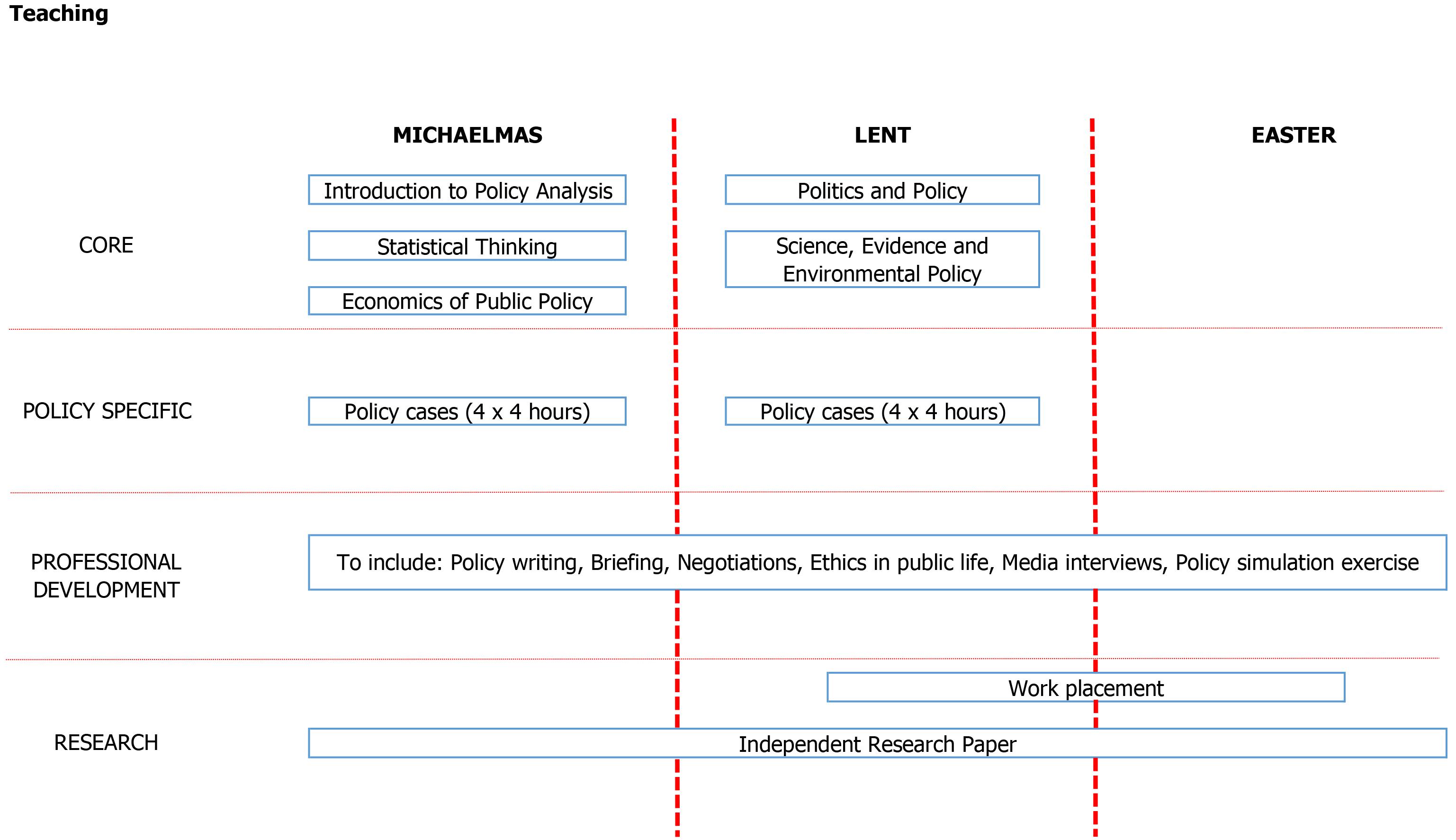
The figure below illustrates the expected structure of the Cambridge MPhil in Public Policy (MPP) curriculum for the 2022-2023 academic year divided into Cambridge’s three 8-week teaching terms. Below the figure there are descriptions of the various course components.

*Please note that parts of the programme evolve from year to year, so while this figure and the descriptions below gives a good indication of the program content for 2022-2023, individual components may change in future years.
1. Modules
The skills required to be an effective policy actor are very broad and the five modules of the MPP reflect this breadth. Each module is an assessed component of the programme and provides a different perspective for you on the what, how and the why of policy choices. Module leaders are experts from the Department and the wider University.
- Introduction to Policy Analysis
- Economics of Public Policy
- Politics and Policy
- Science, Evidence and Environmental Policy
- Statistical Thinking
2. Case Studies
Public policy ranges across issue areas with each policy area having its own dynamics, history, evidence, and politics. While students will have specific interests, it is important to provide a comparative set of cases from which students can draw lessons on how each issue evolves and the types of approaches that were used to achieve improvements in a given area.
Our case studies are led by an expert in the topic and delivered as a pair of 2-hour seminars. Four case studies are delivered in the Michaelmas and Lent Terms covering a range of areas to familiarize the student with various areas and also to give students a broad choice of areas for more in-depth analysis (for assessment purposes, students will select one case study from each of the Michaelmas and Lent Term offerings to focus on, turning in two 3000 word written pieces, based on their chosen topics.)
3. Supervised Independent Research
The independent research module straddles the three terms of the MPP and provides the opportunity for students to delve deeper into particular areas of interest. Students complete one policy paper on a topic chosen by them with the agreement of their supervisor and all students carry out a work placement over 16 weeks with a leading policy organisation completing a long policy analysis paper on behalf of the organisation that they are working with.
Independent Research Papers
Students will complete one assessed independent research paper based on topics of their choice. This paper will be submitted at the end of the course. This paper takes the form of a policy brief. The purpose of a policy brief is to make recommendations for specific action on the part of a named briefee, and to give rationale for choosing a particular policy alternative or course of action over others in a current policy debate. Significant primary research, quantitative and/or qualitative analysis and/or evidence synthesis will form the foundation for most independent papers and should be discussed in supervisions with your advisor.
Work Placement
The second (and major component) of the assessed Supervised Independent Research component is the Work Placement.
This is a 16‐week programme that will take place during the Easter vacation and through the extended Easter Term during which students will work with an organisation external to the University, for whom they will deliver a policy document addressing a key issue. The Work Placement includes 4-6 weeks working with the client organization and 10 - 12 weeks in Cambridge.
The Work Placement enables students to integrate and apply the core technical and managerial skills and specialist knowledge they have gained on the course. Students work with their client to define the problem then design a strategy to address it, gather the relevant data, formulate and evaluate options and report recommendations. This work forms the basis of a final work placement report.
Previous Cambridge MPP students have worked in government agencies in the UK, leading international organizations, think tanks, NGOs, industry groups including for example the Cabinet Office, HM Treasury and the Institute for Public Policy Research (IPPR).
4. Skills Development
Professional Skills Development
As a practice oriented graduate degree we have included a set of sessions to help students develop their skills in four critical areas:
- Writing for policy
- Presenting policy ideas
- Managing media interviews
- Negotiating policy outcomes
These four areas will be explored through short introductory lectures, practical exercises, and group discussions. Students will also review one another’s work and develop a broad perspective on approaches to writing, presenting and negotiating policies. These sessions are intended to help students make the journey from analysis to influence, from having the core skills in policy analysis (such as regression analysis) to having the extended skills of writing effectively and presenting persuasively. This component of the course is not assessed.
Policy Analysis Exercise
The Policy Analysis Exercise (PAE) is a one-week (Friday to Friday) group simulation exercise held in the Easter term to integrate the skills and issues that the students have been working with over the Michaelmas and Lent terms and, while not assessed, is a key element to bring the course together. Students work in assigned groups and manage their own time and leadership structure to respond to a significant policy challenge presented to them on the first Friday of the exercise.
The PAE is delivered in partnership with a major governmental department or international organisation to work on a current ‘live’ topic, so that students have the experience on working on an issue in real time. Examples of past PAE’s include developing a national strategy for dementia in partnership with the World Health Organisation (WHO) and working refugee integration into the economy of Jordan with the UNDP.
The simulation begins with a briefing from the client organisation, setting the terms of the problem and the question they need answered. Students are then divided into teams and provided with a significant amount of background material. Through the week experts from academia, government and the wider policy community provide briefings to assist the students in developing their responses.
The simulation ends with each team providing a briefing to the client, as well as delivering a 20 page briefing book summarising their recommendation and analysis. A prize is awarded each year for the best PAE group and is presented during a dinner at the end of the Easter term.
5. Additional Student Events
MPP Forum
The Cambridge MPP attracts students from around the world and typically our students have between two- and five-years’ experience (some more, some less) in the public sector, the not-for-profit sector, or the private sector. Students are offered the choice to run their own MPP Forum on a weekly basis structured as they see fit to share experience, knowledge and future plans (this component is elective and not assessed).
MPP students from the previous cohorts have themselves taken the initiative to organise their own regular workshop at which matters of common interest have been discussed and speakers invited. The teaching staff offer whatever support for it they can, including booking a room on a weekly basis and providing other support for the class as part of these meetings.
A bi-weekly podcast run and produced by students of the MPhil in Public Policy programme at the University of Cambridge. The podcast looks at contemporary policy issues from around the globe and explores possible solutions through interview-style conversations with experts, academics and policy practitioners. It also draws on the rich experience and knowledge of all listeners by encouraging them to send in “Policy Notes”.
MPP Social Media
Cambridge Public Policy Seminars
These bring together a diverse range of individuals from the humanities as well as social sciences and natural sciences, to discuss the public policy implications of their work. The CPP seminars are organized by the MPP and the Cambridge Public Policy Strategic Research Initiative. They are held throughout Michaelmas and Lent terms.
A highlight of these seminars is the Annual Public Policy Lecture, which includes a leading scholar or practitioner followed by a black-tie dinner at one of the colleges.
